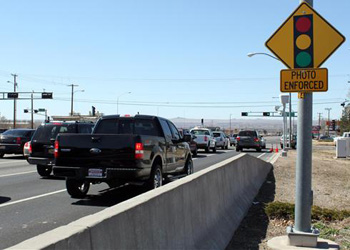
Traffic passes a red-light camera on Paseo del Norte, a busy street in Albuquerque, in March. (Susan Montoya Bryan, AP)
Along the USA's streets and highways, one issue mirrors the nation's partisan divide: using cameras to catch drivers who speed or run red lights.Some communities embrace the devices and pass laws to allow them; others protest their presence or enact laws to abolish them.
Advocates of cameras say automated traffic enforcement is going to be increasingly necessary as the nation seeks further reductions in road deaths. The National Safety Council supports such enforcement "solely for its safety benefit." The Federal Highway Administration says such "technology can make highways safer."
Many Americans, however, view traffic cameras warily and suspect they are used chiefly to generate revenue. That suspicion has been heightened during the economic downturn, says transportation analyst Alan Pisarski, author of Commuting in America. "We're in a tough time economically where governments are all stuck for cash, so people are saying they're doing this because they need money," he says.
Speeding is a factor in more than 31% of traffic fatalities, according to the National Highway Traffic Safety Administration. In 2008, 762 people were killed and about 137,000 injured in crashes that involved red-light running, according to the Insurance Institute for Highway Safety.
The effectiveness of camera enforcement is one of the most hotly debated topics in traffic safety. A federal study found that red-light cameras cause a 25% decrease in broadside crashes and a 15% increase in less deadly rear-end crashes. An NHTSA review of studies worldwide found that speed cameras reduce crashes by 9%-51%.
Red-light cameras are used in 441 communities in 25 states and the District of Columbia and speed cameras in at least 56 communities in 12 states and D.C., the Insurance Institute says.
At least six states - Maine, Mississippi, Montana, Nevada, New Hampshire and West Virginia - prohibit camera enforcement, according to Anne Teigen, a transportation policy specialist at the National Conference of State Legislatures; Nevada exempts cameras operated by an officer or installed in a police vehicle or facility. Arkansas, New Jersey and Wisconsin prohibit speed cameras. Illinois, Missouri, Louisiana and Tennessee are considering bans on camera enforcement, she says.
Among places giving traffic cameras a green light:
• Ridgeland, S.C., where the state's first speed cameras will be installed this summer along Interstate 95 in the town of 2,500, says town administrator Jason Taylor. "The average ticket is going to be $130 for 10-15 mph over the speed limit," he says. About 42,000 vehicles use that stretch of interstate daily.
• Florida, where a backlash against red-light cameras had been growing, moved a big step closer to approving them last month. The Legislature sent Republican Gov. Charlie Crist a bill that establishes statewide guidelines for the cameras. Crist probably will sign the bill, says Sterling Ivey, his spokesman.
• Baltimore County, Md., uses cameras in school zones. The state uses them in some freeway work zones.
• Alabama approved red-light cameras this year in Tuscaloosa. Connecticut is considering allowing them in New Haven. Waco, Texas, and Newport News, Va., plan to install them. Charlotte, which removed its red-light cameras in 2007, is considering reinstalling them.
Among communities challenging camera enforcement:
• Sykesville, Md., banned the use of speed cameras via referendum last week, joining at least six other cities that have vetoed traffic camera enforcement at the ballot box. They include Sulphur, La.; Steubenville, Chillicothe, Cincinnati and Heath, Ohio; and College Station, Texas.
• Houston could put the city's 70 red-light cameras to a referendum in November.
• Anaheim, Calif., which has no red-light cameras, is moving toward a vote in November on a proposed ban. "Many of the cities that are new to their use are looking at ways to raise revenue," Mayor Curt Pringle says. "I think raising revenue on the back of public safety is a bad idea."
• Arizona last week ended its program that put speed cameras along freeways in the Phoenix area and in vans deployed around the state. The cameras, which photographed speeders going at least 11 mph over the speed limit, will be idled in July.
• A group in western Washington state has held protests since March at intersections with red-light cameras. "Most people hate these things. They don't make the streets safer," says Nick Sherwood, 35, a telecommunication wiring contractor who started the website Bancams.com with his wife, Tiffany. "Our goal is a statewide ban on camera-based traffic enforcement."
"In principle, I think photo enforcement is valid if it's done right. You can't have a cop everywhere, and yet the law is supposed to be enforced everywhere," says Robert Poole, director of transportation policy at the non-profit, libertarian Reason Foundation, which researches public policy. "The problem is a lot of times, cities go into this looking mainly at revenue rather than safety."











